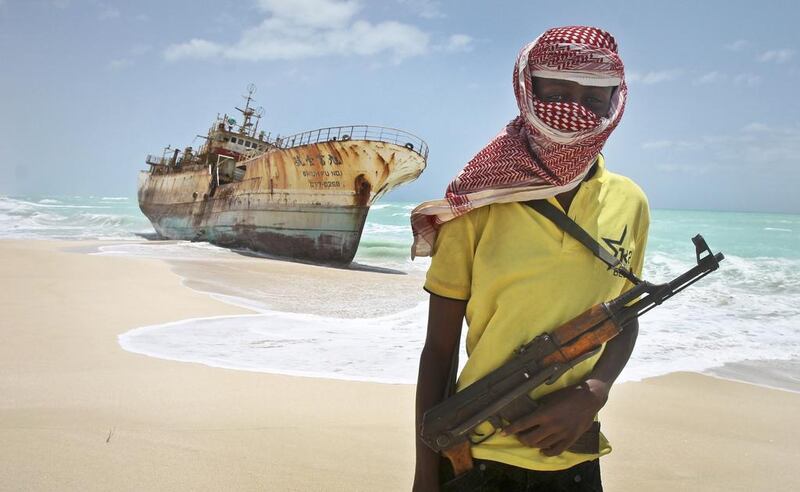DUBAI // Greater vigilance has been urged to stop a resurgence of Somali pirates who have carried out four hijackings in a month.
Experts warned that a few successful attacks would encourage criminal gangs in high-risk areas off the African country’s coast.
A piracy watchdog, United Kingdom Maritime Trade Operations, said last night that a vessel had been attacked and boarded off the coast of Yemen. “Vessels transiting the area are advised to exercise extreme caution,” it said. The vessel is thought to be a bulk carrier.
On March 31, the dhow Al Kausar and its cargo of rice and wheat were hijacked en route from Dubai to Yemen. Its 10 Indian sailors are still in captivity.
Twenty crew on a dhow that was seized on March 23 have been released, while on March 13 eight Sri Lankans were taken hostage on the UAE-managed tanker Aris 13 – the first hijacking by Somali pirates since 2012.
Last month, the Aris 13 crew were freed after four days when forces from the Puntland maritime police choked off weapon supplies to the pirates.
While the families of the imprisoned Indian sailors await news, the loved ones of the freed Aris 13 hostages are preparing to welcome their men home.
Samudra Hettarachchi, in Colombo, is haunted by the call from husband Sunil Bulathsinhala when his Somali captors forced him to push for their ransom demands.
“I can’t think of my husband going back to sea because, until I die, I will not forget his voice when the pirates made him call us and we thought it was the last time we would hear him,” Ms Hettarachchi said.
“Companies must provide strong security. The crew must insist on security but they want to earn so they will sail.”
Naval patrols, armed guards on merchant ships, barbed wire, water spray and increased speed in piracy areas have deterred attacks in recent years. But the threat continues while poverty and unemployment in Somalia remain.
“Sailors believe they are safe because things have been quiet, but they are not thinking about the hunger, drought and unemployment in Somalia,” said Saeed Rageh, minister for ports in Puntland, a semi-autonomous region of Somalia. “People lost livestock in the famine and everything they depended on. This could restart the issue.”
In Al Kausar dhow attack, experts believed the cargo of rice and wheat was the pirates' focus.
The dhow’s owner told Chirag Bahri, the International Seafarers Welfare and Assistance Network’s South Asia director, that he was in touch with the families of the hostages.
The 10 men belong to a small seafarers’ community near Mandvi in the Kutch area of Gujarat state in western India.
“Since it’s a dhow it would have been travelling at a very low speed so it would be an easy target for the pirates,” Mr Bahri said.
“Sailors must be prepared and undergo drills even in small dhows so they stay safe if attacked. They can’t think that because no ships were taken for five years, it is OK. It requires just one bad period for pirates to go out for more strikes.”
Cyrus Mody, assistant director of International Maritime Bureau, said: “Somalia is in a fragile state with limited law enforcement and response capability.
“There are large swaths of coastline not governed or controlled.”
The bureau warned seafarers to take protective measures and stay vigilant.
“We don’t believe Somali piracy have gone away,” Mr Mody said. “They still maintain the capacity to carry out attacks. What was lacking was opportunity.
“We need to push the message out for all seafarers to ensure that all procedures are followed while transiting these waters.”
rtalwar@thenational.ae







